Key takeaways
- Voter education empowers citizens, enhances participation, and strengthens democracy by emphasizing the importance of every vote.
- Initiatives in Louisiana include voter registration drives, workshops, online resources, community engagement, and youth programs targeting underserved communities.
- Challenges like misinformation, accessibility issues, and historical disenfranchisement hinder voter education efforts.
- Effective advocacy strategies involve storytelling, collaboration with local organizations, and addressing misconceptions to boost voter confidence and turnout.
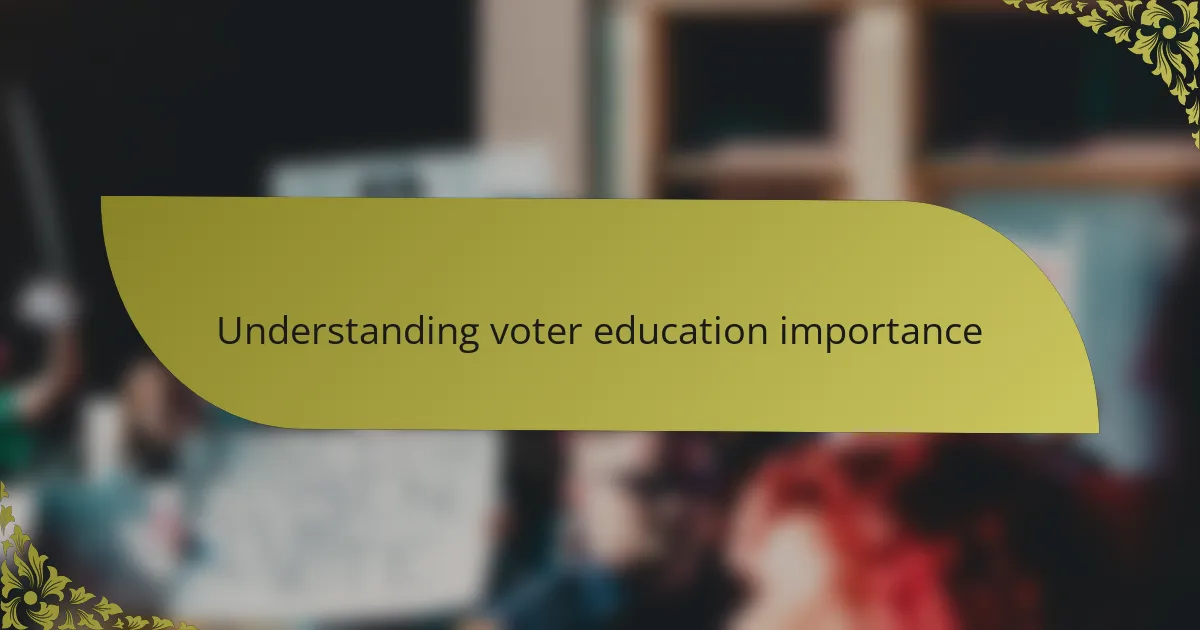
Understanding voter education importance
Voter education is crucial because it empowers citizens to make informed decisions at the polls. I’ve seen firsthand how a lack of understanding can lead to apathy and confusion. During my time advocating for voter education, I noticed that many people were unsure about how their votes truly impacted local issues, which only fueled their disinterest.
It’s not just about understanding how to vote; it’s about recognizing the significance of each ballot. I remember engaging with a group of young voters who thought their voices didn’t matter. When I shared stories of local elections decided by just a handful of votes, their perspective began to shift. They realized that every vote carries weight, especially in a state like Louisiana, where every election feels personal and vital.
Here are some key points on the importance of voter education:
- Empowers individuals with knowledge about the voting process and their rights.
- Fosters engagement and participation in local and state elections.
- Helps to dispel myths and misinformation that can lead to disenfranchisement.
- Encourages informed decision-making, enabling voters to understand issues on the ballot.
- Strengthens democracy by ensuring diverse voices are heard and represented.
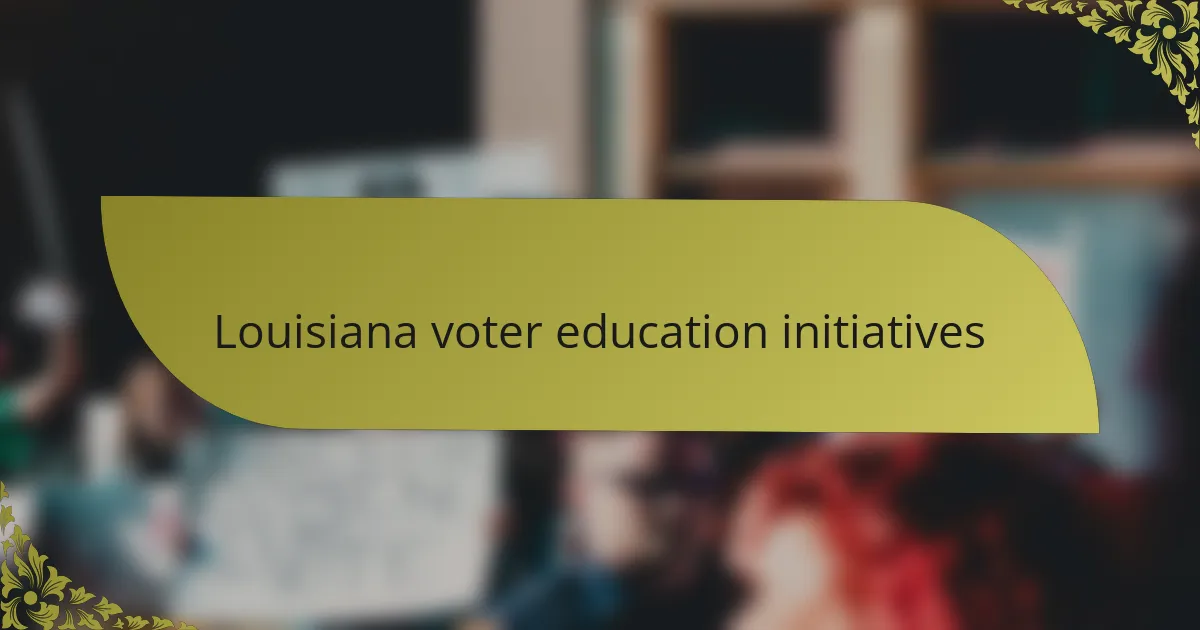
Louisiana voter education initiatives
Louisiana has implemented a variety of voter education initiatives aimed at informing residents about their rights and the voting process. I’ve personally witnessed the impact of programs that target underserved communities, where it’s not just about casting a ballot; it’s about empowering individuals. I remember attending a local workshop where participants shared their experiences about the confusion surrounding voter ID laws, and it became clear just how crucial these initiatives are in demystifying the voting process.
Here are some key Louisiana voter education initiatives that stand out:
- Voter Registration Drives: These events help people sign up to vote, often providing on-the-spot assistance.
- Workshops: Informative sessions focus on the voting process, including how to cast a ballot and understand local elections.
- Online Resources: Websites and social media campaigns offer accessible information on voting rights and deadlines.
- Community Engagement: Collaborations with local organizations bring voter education directly to neighborhoods, fostering trust and understanding.
- Youth Programs: Initiatives targeting schools aim to educate the next generation about civic responsibility and the importance of participation in democracy.
These efforts uniquely connect with the community and pave the way for an informed electorate.
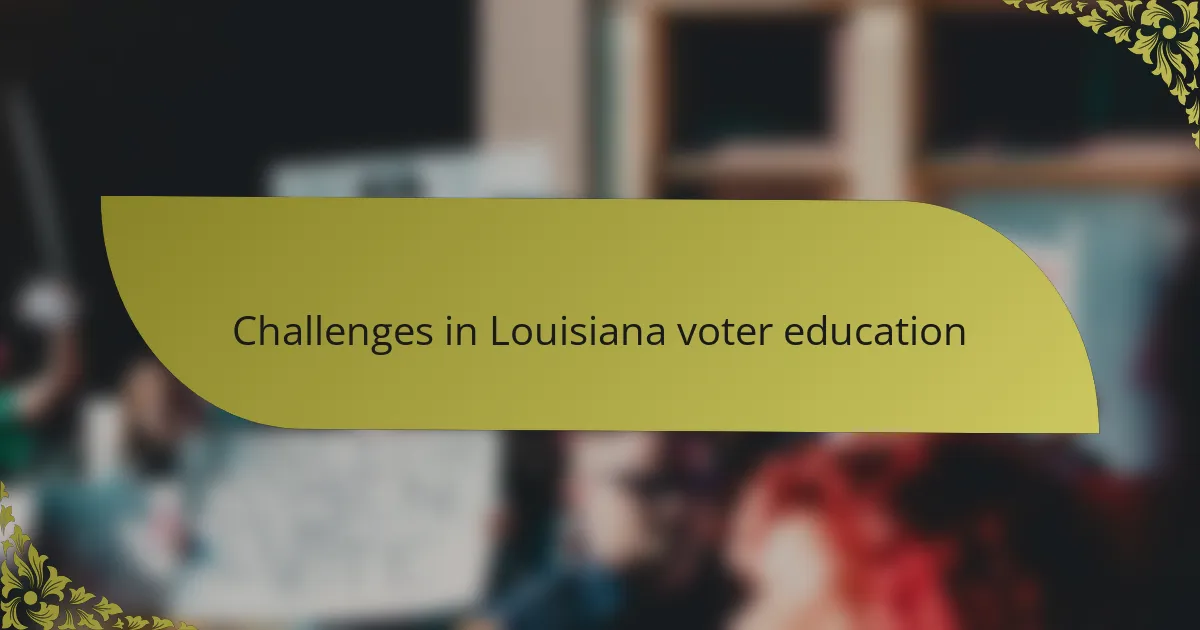
Challenges in Louisiana voter education
The challenges in Louisiana voter education are many and multifaceted. One significant hurdle I’ve encountered is the widespread misinformation that lingers, especially on social media. During community events, I often hear conflicting information about voter ID requirements, and it becomes clear that people’s fear is rooted in misunderstanding. Isn’t it frustrating to think some might skip voting simply due to confusion?
Another issue that strikes me is the accessibility of information. While online resources are plentiful, many residents in rural areas lack reliable internet access. In my experience, I’ve met individuals who didn’t know about their voting rights because they couldn’t find information easily. This disparity leaves vulnerable populations in the dark. How can we expect full participation when a whole segment of the community is left out?
Finally, the apathy stemming from historical disenfranchisement is palpable. I remember speaking with older voters who recounted their past struggles for civil rights. Their stories are not just memories; they’re a reminder that the fight for inclusive democracy continues. How can we make sure that future generations don’t feel disheartened? We need to break down these barriers to cultivate a culture where every voice is valued and every vote matters.
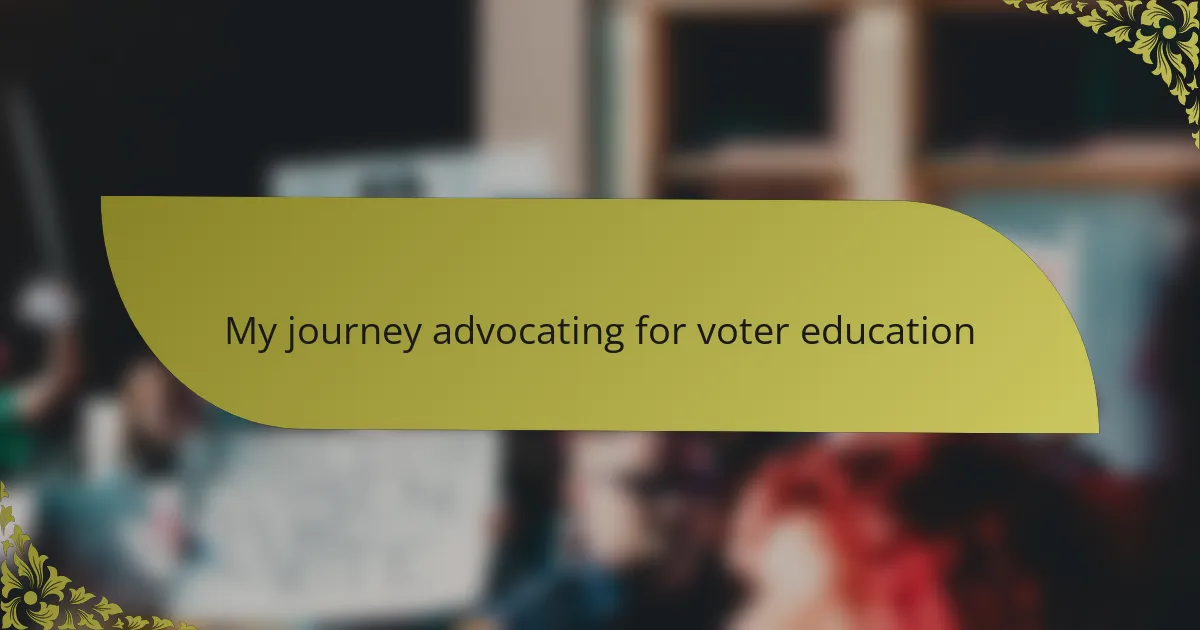
My journey advocating for voter education
I remember the moment my journey in advocating for voter education truly began. I was at a local community event, chatting with a young woman who expressed disbelief that her single vote could ever make a difference. It hit me hard—how often do we underestimate the power of our voices? I made it my mission to show others that each ballot is like a thread in the fabric of democracy.
As I engaged with various groups, I found that conversations about voting rights often opened doors to deeper discussions about civic engagement. There was one memorable workshop where a gentleman shared how he had almost decided against voting because he felt disconnected from the issues on the ballot. By the end of our discussion, he was animatedly discussing plans to get involved in local advocacy. Moments like these made me realize that education isn’t just about facts; it’s about igniting a sense of purpose and belonging.
However, the path hasn’t been without challenges. I recall a particularly eye-opening experience at a town hall meeting, where many attendees were misinformed about the voting process. It wasn’t just about correcting misinformation—it was about rebuilding trust. I often ask myself, how can we bridge the gap between disenfranchisement and empowerment? My journey taught me that persistence in education can open doors and inspire change, one conversation at a time.
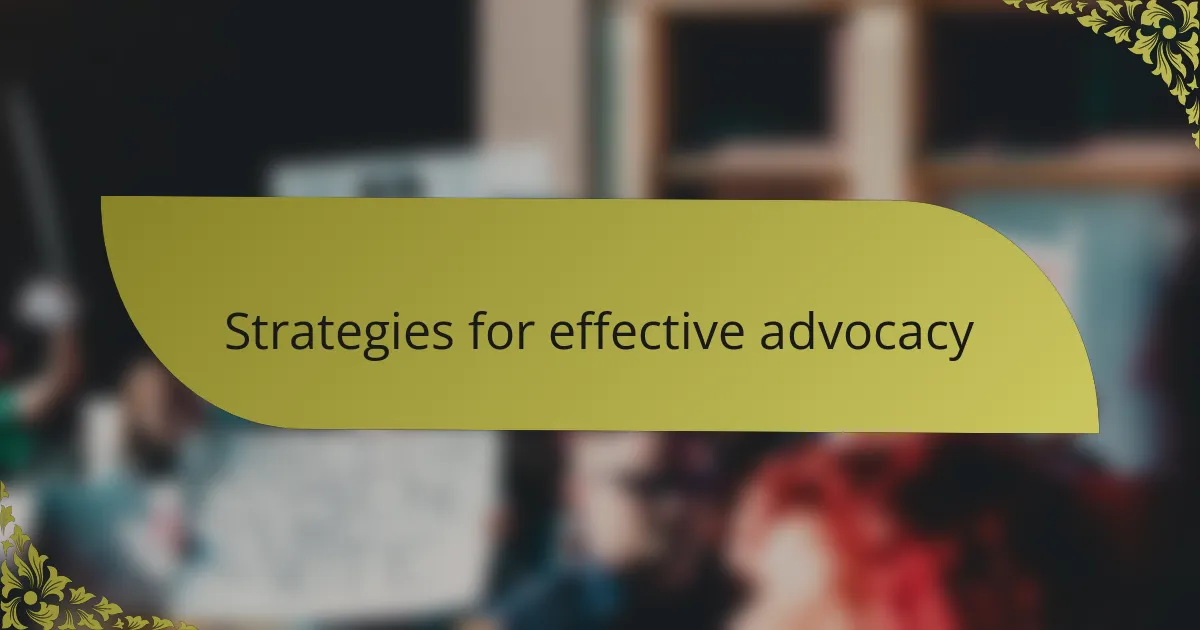
Strategies for effective advocacy
One effective strategy I found in my advocacy is storytelling. I remember sharing a personal story about my first time voting. By illustrating my emotions—excitement mixed with anxiety—I noticed how it resonated with others. People opened up about their feelings regarding the voting process, which helped create a safe space for discussion. I’ve learned that when we share our journeys, we not only inform but also inspire others to find their own voices.
Another approach I embraced is collaborating with local organizations. I vividly recall working alongside a group that focused on youth outreach. Together, we hosted an event that combined fun activities with discussions about voting. The energy in the room was palpable. Young people were engaged, asking questions and eager to learn more. This taught me firsthand how making education enjoyable can foster deeper connections and commitment to civic engagement. Isn’t it amazing how a little creativity can transform a topic like voting into something vibrant and relatable?
Finally, consistently addressing misconceptions is key. I’ve seen how debunking myths about the voting process can spark curiosity and motivate people to participate. I remember presenting at a community meeting where one participant voiced a common misconception around voter ID laws. As I calmly explained the facts, I could see the lightbulb moment— a mix of relief and understanding on their face. This reinforced my belief that clear, accurate information is powerful. How many potential voters are out there waiting for someone to clear up their confusion? It just takes one conversation to change the narrative.
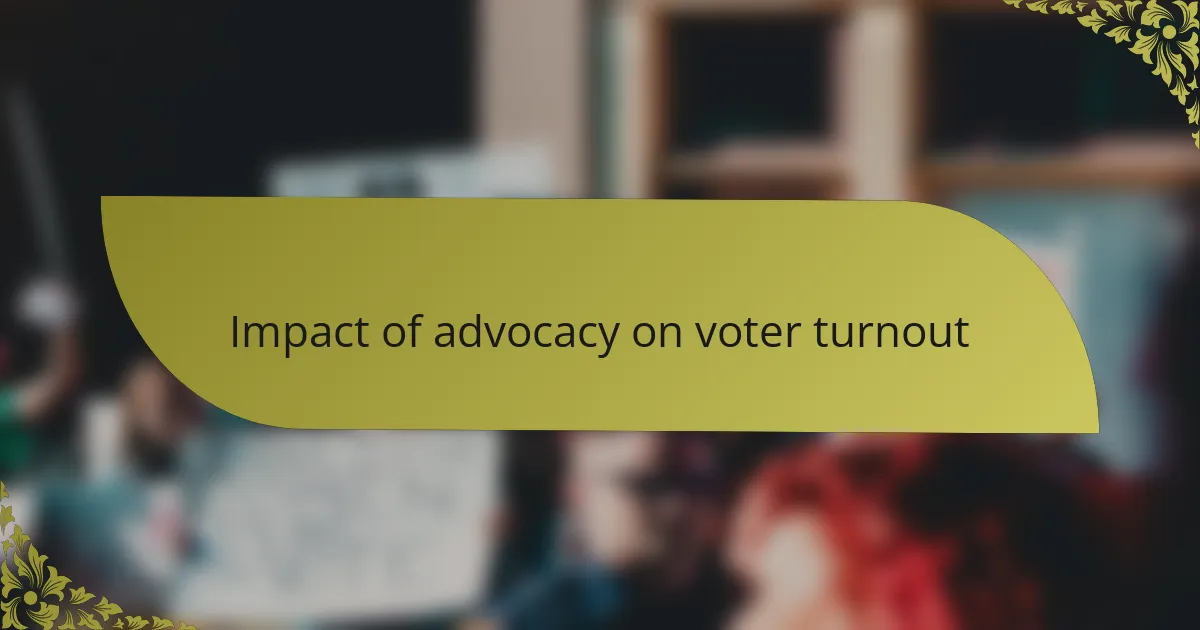
Impact of advocacy on voter turnout
Advocating for voter education has a profound impact on voter turnout, especially in states like Louisiana, where historical barriers to voting persist. I recall attending community meetings where we discussed the importance of understanding voter rights and the voting process. Seeing residents light up when they realized they could make their voices heard was incredibly rewarding; it’s moments like these that fuel my passion for advocacy.
When people feel informed and empowered, they’re more likely to head to the polls. Through our efforts, we not only raised awareness but also fostered a sense of community engagement. I believe that when citizens understand the power of their vote, they are motivated to participate in shaping their government.
- Increased awareness leads to higher participation rates.
- Education reduces confusion about voting processes, such as registration and polling locations.
- Personal stories of overcoming barriers inspire others to engage.
- Community events provide a platform for collective action and support.
- Accessible information strengthens voter confidence and trust in the electoral system.
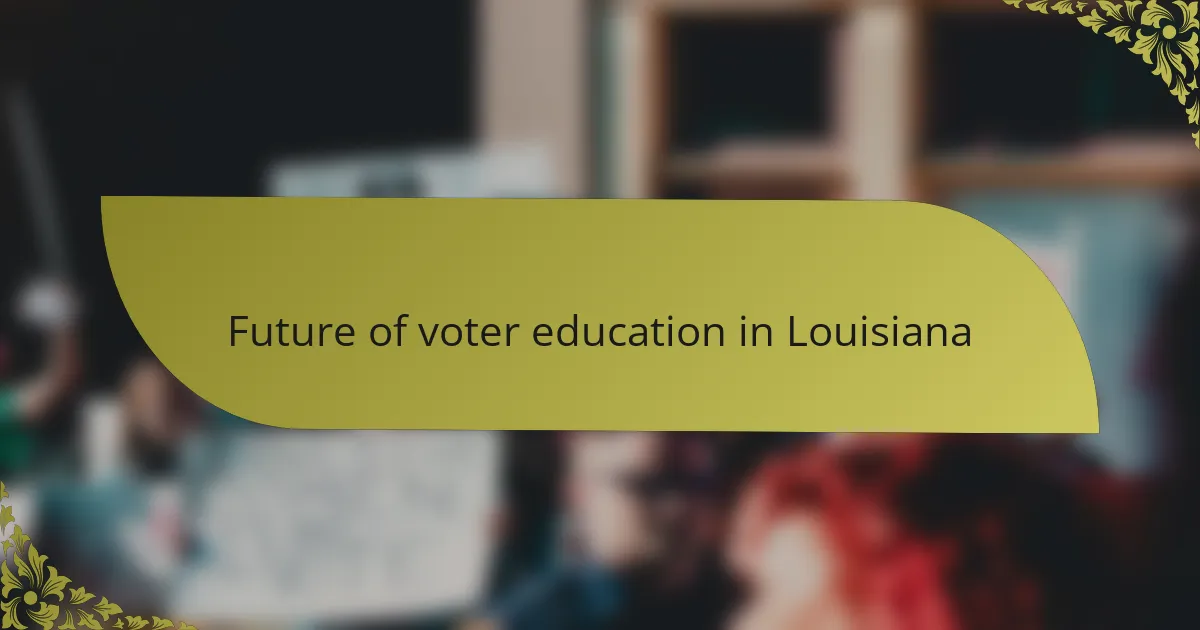
Future of voter education in Louisiana
The future of voter education in Louisiana is both promising and challenging. I believe that as more community organizations embrace outreach programs, we’ll see increased participation in elections. In my own experience, witnessing individuals gain confidence in their voting rights was incredibly rewarding; it reminded me of the power that knowledge holds.
I also see a crucial role for technology in this future. With more people accessing information online, digital platforms can help simplify complex voting processes and make them more approachable. I remember a time when a simple social media post I shared sparked conversations in my community and encouraged friends to learn about their ballots. It’s moments like these that show how engagement can grow.
| Current Challenges | Future Opportunities |
|---|---|
| Lack of awareness about voting rights | Increased community outreach programs |
| Limited access to information in rural areas | Utilization of digital tools for education |